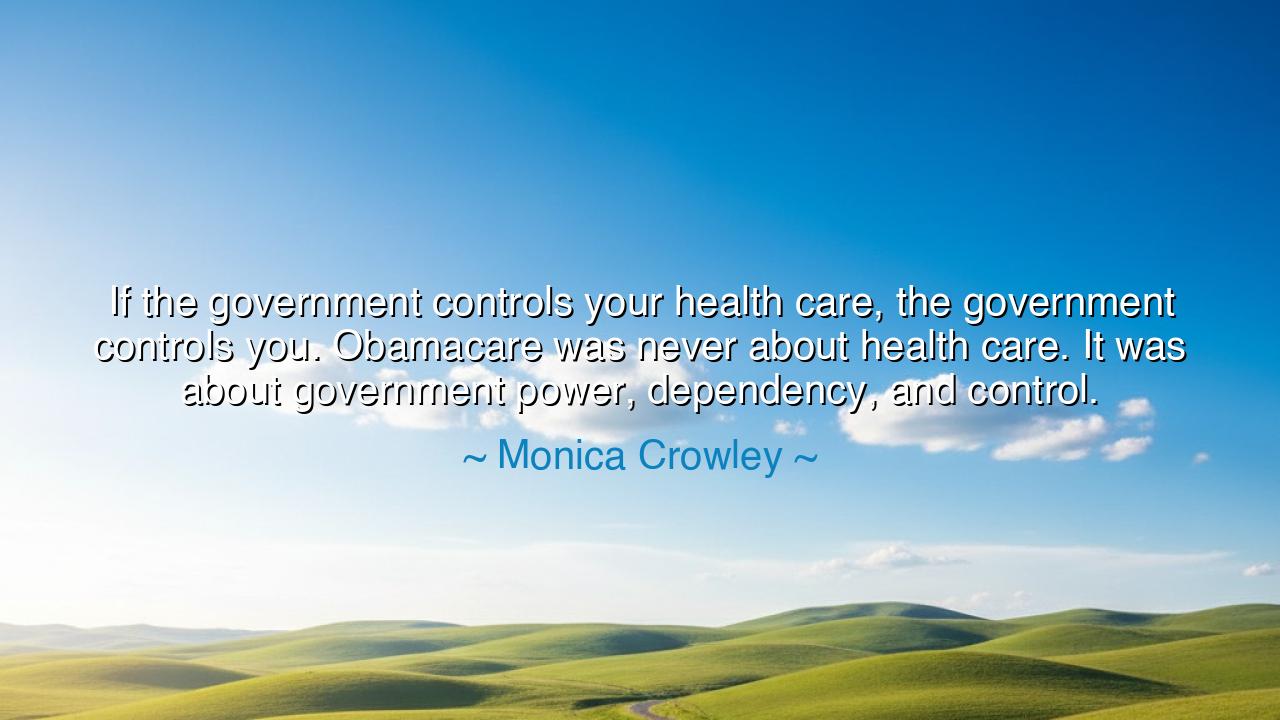
If the government controls your health care, the government
If the government controls your health care, the government controls you. Obamacare was never about health care. It was about government power, dependency, and control.






“If the government controls your health care, the government controls you. Obamacare was never about health care. It was about government power, dependency, and control.” Thus spoke Monica Crowley, a commentator of fierce conviction, whose words echo with the age-old warning that freedom and dependency cannot dwell under the same roof. Though spoken in the context of modern politics, her declaration bears the tone of ancient prophecy — for she touches upon one of civilization’s most enduring truths: that when power centralizes in the hands of the few, the liberty of the many begins to wither.
At the heart of this quote lies the belief that health care, though noble in purpose, becomes a double-edged sword when bound to the machinery of state. For in the name of benevolence, governments may seize not only the power to heal, but the power to command. Crowley warns that when the state holds the key to one’s well-being, it also holds the chain to one’s obedience. If your medicine, your treatment, your very life depend on the favor of authority, then your freedom becomes a privilege, not a right. Thus, she declares that the battle over health care is not merely about hospitals or doctors — it is about the soul of self-governance, the right to make choices uncoerced by the hand of power.
Such fears are not new. History abounds with tales of rulers who promised protection, only to demand submission in return. In ancient Rome, the emperors secured the loyalty of the masses with “bread and circuses,” feeding and entertaining them while quietly tightening their grip on power. What began as generosity ended in tyranny, for dependence is a soft chain — unseen until it hardens. So too, Crowley warns that when the people grow accustomed to receiving all from the state, they risk losing the courage to stand apart from it. The price of convenience may be liberty itself.
Yet the truth she speaks is not meant to sow distrust, but to awaken vigilance. Government, like fire, can warm the hearth or consume the home. It is not inherently evil, but dangerous when left unchecked. Crowley’s warning arises from a belief deeply rooted in the American spirit — the belief that freedom thrives best when power is divided and restrained, when citizens are not subjects but stewards of their own destiny. To her, policies like Obamacare, though framed as compassion, risked creating a system in which individuals would look not to their own strength, but to authority for salvation. And when a people forget how to care for themselves, they become as clay in the hands of their rulers.
Consider the cautionary tale of Alexis de Tocqueville, who, in his travels through the young United States, foresaw the danger of what he called “soft despotism.” He spoke of a time when governments would no longer oppress with brutality, but with benevolence — smothering the spirit of independence under a blanket of security and comfort. Such control, he warned, would make men “like timid animals,” who believe they are free because they are allowed to live and work, even as their souls are bound by invisible cords of regulation and dependence. Crowley’s words reflect this very fear — that the erosion of liberty does not always arrive with chains and soldiers, but with paperwork, policies, and promises of safety.
But her message, though fierce, is also a call to courage. For it is not enough to lament the loss of freedom — one must guard it daily. True liberty demands responsibility: to earn, to choose, to fail, and to rise again without waiting for the hand of authority. Freedom is not comfort; it is risk. It is the willingness to bear the weight of self-reliance, even when the path is uncertain. Crowley’s warning reminds us that a nation’s strength lies not in how much it depends upon its government, but in how deeply its people depend upon themselves and upon one another.
Therefore, O seekers of truth, remember this: every law that protects can also confine, and every gift of the state can become a leash. Guard your independence as you would your life, for it is the breath of your dignity. Help the weak, but never surrender your will. Seek health, but never trade freedom for comfort. Let government serve, not rule; let charity lift, not bind.
For when men and women possess the courage to govern their own lives — when they choose strength over dependency and freedom over fear — then no empire, however vast, can command their souls. As Monica Crowley’s words remind us, the greatest battle for liberty is not fought with armies, but within the human heart — where each must decide whether to live as a free soul or a managed subject.






AAdministratorAdministrator
Welcome, honored guests. Please leave a comment, we will respond soon